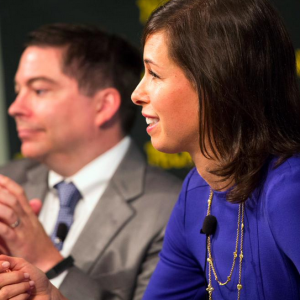With less than a week to go before the Federal Communications Commission votes to make cable providers offer apps in place of set-top boxes, pressure from the industry and Congress to delay the plan is building on commissioners, with one in particular seen as the crucial swing vote that could make or break the proposal.
The FCC is scheduled to vote on Chairman Tom Wheeler’s plan during its open meeting on Sept. 29, which if adopted, would compel cable and satellite TV providers to offer their content on apps instead of forcing subscribers to rent set-top boxes for a monthly fee the FCC claims costs consumers $231 every year (opponents debate that amount).
Though the industry itself pitched the app proposal in place of Wheeler’s original plan, they still have problems with the latest version — chiefly a provision that would give the FCC authority over licensing contracts between pay-TV providers and third party devices capable of downloading their apps.
Opponents say the FCC has no authority to oversee copyright and licensing, a position Commissioner Jessica Rosenworcel — one of the two Democrats on the commission Wheeler needs to pass to plan — indicated she may agree with. With the commission’s two Republicans already indicating they won’t support the plan, Wheeler’s plan is sunk without Rosenworcel, who faces mounting pressure from lobbyists like the National Association of Broadcasters (NAB) to vote against it.
“Commission involvement in writing the substantive terms of any license under this proposal would exceed the commission’s authority and fatally undermine the commission’s stated goal of protecting content and respecting copyright and contracts,” NAB President Gordon Smith told Rosenworcel in a phone call this week, according to trade publication Broadcasting & Cable.
Last week, Rosenworcel told Congress she had “some problems with licensing and the FCC getting a little bit too involved with the licensing scheme here.”
“Because when I look at the Communications Act and Section 629, I just don’t think we have the authority,” she said.
Republicans in the Senate who expressed their discontent with the plan during an FCC oversight hearing last week were joined by their colleagues across the aisle and the Capitol on Thursday, when 63 House Democrats led by California Rep. Tony Cárdenas sent a letter to the commission urging Wheeler to hold another round of comments on the plan before moving forward.
“It is difficult to analyze the full scope of the standard license and the FCC’s role in developing and enforcing this license without knowing the full details of the proposal,” they said in a letter reported by The Hill. “Commissioners should have the opportunity to place their vote knowing how the industry will be impacted and it is imperative that any new rules be adopted through a transparent and inclusive process.”
The last-minute opposition isn’t limited to copyright. In a Wednesday filing caught by Fierce Cable, Verizon said it may not be technically unfeasible to require pay-TV providers, known as multichannel video program distributors (MVPDs) to the FCC, to build apps across the range of devices the agency stipulates in its plan, but it requires extensive resources to make content compatible with every platform.
“We understand that MVPDs will be required to provide apps to ‘widely deployed’ platforms,” Verizon said in a letter to the agency. “Developing customized apps for device platforms can be costly and resource intensive, requiring expert personnel to work closely with device makers to ensure a high quality customer experience. We have every incentive to make our content accessible on popular devices that our customers want to use, but MVPDs cannot be expected to build apps for an indeterminate number of platforms or devices.”
The plans calls for MVPDs to make apps for any third-party device with an operating system that’s sold at least 5 million units, including devices like Chromecast, Amazon Fire, Apple TV, Roku, video game consoles, tablets and smartphones. Devices like the latter two could carry an additional burden, Verizon explained, because of a requirement for quality and technical parity across devices, some of which lack the capability to download, store and playback programming — capabilities required under the plan.
During last week’s hearing Wheeler said “the door isn’t closed” on the plan, and urged his colleagues to use the time before the vote to make changes and compromise. A spokesperson for the chairman’s office confirmed in a statement Thursday the vote will proceed as scheduled.

